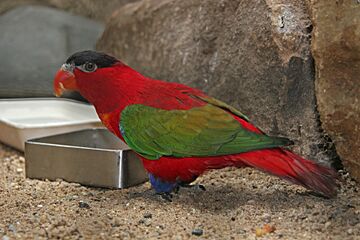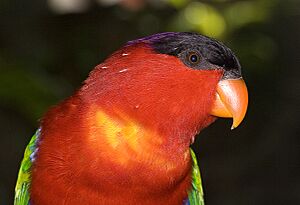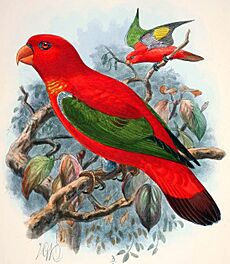Purple-naped lory facts for kids
Quick facts for kids Purple-naped lory |
|
|---|---|
 |
|
| At Natura Artis Magistra (Artis Zoo), Netherlands | |
| Conservation status | |
| Scientific classification |
|
| Kingdom: | Animalia |
| Phylum: | Chordata |
| Class: | Aves |
| Order: | Psittaciformes |
| Family: | Psittaculidae |
| Genus: | Lorius |
| Species: |
L. domicella
|
| Binomial name | |
| Lorius domicella (Linnaeus, 1758)
|
|
| Script error: The function "autoWithCaption" does not exist. | |
| Synonyms | |
|
|
Script error: No such module "Check for conflicting parameters".
The purple-naped lory (scientific name: Lorius domicella) is a colorful parrot that lives in forests. You can only find this special bird on a few islands in Indonesia. These islands are Seram, Ambon, and possibly Haruku and Saparua in South Maluku.
Sadly, the purple-naped lory is an endangered bird. This means there are not many left in the wild. The biggest danger to them is people catching them to sell as pets.
Discovering the Purple-Naped Lory
Scientists formally described the purple-naped lory a long time ago. A Swedish naturalist named Carl Linnaeus first wrote about it in 1758. He gave it the scientific name Psittacus domicella. The word domicella means "damsel" in an old language.
Linnaeus learned about this bird from an English naturalist named George Edwards. Edwards had drawn and described the bird in his book in 1751. The bird he drew had come to London from the East Indies. Linnaeus later said the bird came from Ambon Island in the Maluku Islands. Today, the purple-naped lory is part of a group of parrots called Lorius.
What Does the Purple-Naped Lory Look Like?
The purple-naped lory is about 28 centimeters (11 inches) long. Most of its body is bright red. Its tail is also red, but it gets darker at the very tip.
The top of its head is black. This black color fades into a purple patch on the back of its neck. Its wings are green, and its upper legs (thighs) are blue. It also has a yellow stripe across its chest. This stripe can look a little different on each bird.
The lory has a bright orange beak. The skin around its eyes is dark grey, and its eyes are orange-red. Young purple-naped lories look a bit different. They have a brown beak and grey-white skin around their eyes. Their eyes are brown, and the yellow stripe on their chest is wider. They also have a larger purple area on the back of their neck.




